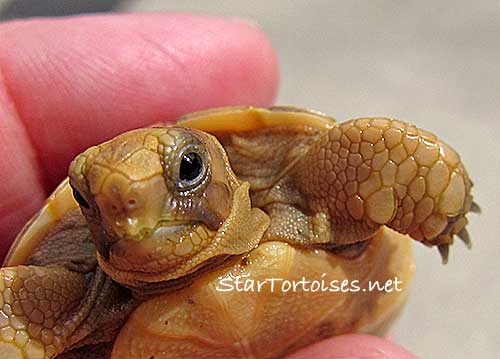


My golden Greek / Mesopotamian Greek tortoises (Testudo graeca terrestris) are not actually golden yellow but more of a yellow-beige or beige color. Some are quite dark as well. They aren't as "fancy" or "pretty" looking as my Burmese stars and angulates, but they have captured my heart with their antics. Among the tortoises I keep, my golden Greeks consistently have some of the best personalities. Even as hatchlings, they are active and spunky.
I keep my goldens, both young and adults, in groups based on their ages and/or sizes and they seem to get along quite well. I have not witnessed too much competitive behavior, not even among the males. However, I have had to reduce the number of males in my groups because they are "lady chasers" and at times they won't leave the females alone. Spring is the most unruly time; that's when males get very amorous and pursue females rather persistently.
During their active periods, my golden Greeks are equally or more active than my Burmese stars. With my Burmese stars it's a bit of hit and miss with their personality. I have a few boys that are very relaxed and not timid at all, but I also have others that spend most of their time hiding in the bushes. I separate my Burmese stars into outdoor groups based on their age, size, gender, and/or personality, but even then some of them stay rather shy and rarely venture on any excursions.
I purchased my Burmese star tortoise foundation group animals as tiny hatchlings (20g+) and then raised them up to producing adults. My most active Burma boys I was able to hand pick as hatchlings. The others I purchased without seeing them in person. I chose my handpicked ones based on their spunkiness level, not based on their looks, and they are indeed my most fearless Burmese. I've raised all my Burmese stars in similar manner, so I'm guessing my bold Burma boys' personalities are at least partly genetic.
My adult angulate tortoises are actually quite laid back and easy going, except the male who at times can be a nuisance to the female. They aren't super shy or secretive. My angulate babies can be either way, some are shy and some are more outgoing.

Golden colored Mesopotamian Greek tortoise hatchling. Look at that cute face. Just perfect!
Here, I am covering the same topics I did on the Star tortoise personality page.
a.) General
In addition for their charming personalities, my golden Greek tortoises are also well suited for full-time outdoor living in my climate. I live in a warm and dry, but not hot, area. Our summers are warm with cool nights and our winters are mild with little rain. During the coldest winter nights, temperature may occasionally drop down to high 30's, but usually stays in the 40's or above at night. On a rare occasion, we may have a night or two just hitting freezing temperatures, but that is not common at all.
I keep my adult, subadult, and young goldens outdoors year round. During the coldest part of the year I provide the more delicate, wild-caught ones with heated night houses or warm artificial caves, but my captive-bred ones have no heaters at all. Both will come out and bask year round, unless it's raining or it's very cold. Then they will stay in their warm houses or other covered shelters.
b.) When alarmed
If anybody is walking by their enclosure, my golden Greeks will stop, stay still, and check out the situation. If everything seems to be all right, like them noticing it's just me, most of them will continue with their previous activity or start running towards me. A few are so shy that they will pull their heads in and stay like that a while.
c.) Daily routine
My goldens will leave their night hides when the morning sun hits their pen creating warm basking spots. They are most active in the mornings after these warm up sessions; ready to eat, run around, or do what ever they feel like doing. Best time to observe them. By late afternoon, most of them have already retired for the night, but some, especially males, may occasionally be active later in the day as well.
d.) Climbing
My goldens are good climbers. They can scale uneven block walls and wire mesh pen walls.
e.) Digging
My goldens do not dig tunnels, but they like to bury their skin parts, head and legs, under the soil when sleeping.
f.) Not big self soakers
I see my goldens drinking from their water bowls, but I seldom see my outdoor adult tortoises soaking themselves. Indoors, I may occasionally find a young hatchling sitting in his water dish.
g.) Activity level
My goldens are active little tortoises, but their active daily periods are shorter than those of my Burmese stars. My goldens can be super active in mornings, but they also like "retire to bed" already in the afternoon. My golden males are noticeable more active than the females who are more mellow and relaxed. Instead of running around, females like to enjoy a good meal or a nice bask in the sun.
h.) Shy or brave?
In general, my goldens are not very shy, but of course some are more timid than others. When I bring them food outdoors, many of them start racing towards me in anticipation of something yummy. Even my wild-caught foundation group goldens do this, not just the ones I've hatched and raised.

Freshly hatched golden Greek / Mesopotamian Greek tortoise. Notice the little egg tooth on his upper beak.

Some of my 3rd generation (2nd captive-bred generation) golden youngsters. The yellow one on the right is almost patternless while the left one has a more typical Greek tortoise shell pattern. Just lighter and more yellow in color.